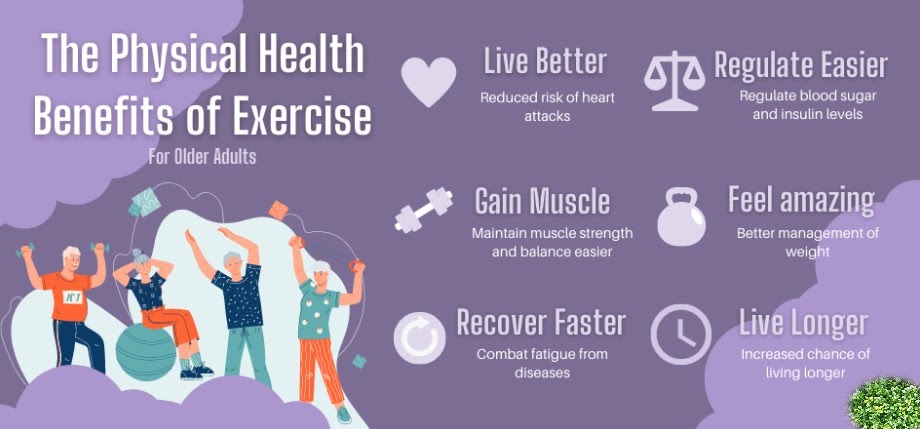
The close relationship between exercise and mental health has always been a topic of interest. While most of us recognize the physical benefits of a good workout routine, the mental health benefits are equally important. This article highlights the countless ways in which regular exercise can improve your mental health, ensuring that both your body and mind remain fit and active. So, let's "sweat out" those sadness and understand the mental rewards that come from physical exertion!
1. Natural Mood Enhancer: Say goodbye to stress!
Exercise triggers the release of endorphins – often called the body's natural painkillers. These chemicals in the brain act as mood lifters, significantly reducing feelings of stress and anxiety. So, if you've had a long day, a short walk or brisk walk can help clear your mind and improve your mood.
2. Boosting self-esteem: feeling good inside and out
Staying committed to a workout routine can create a feeling of accomplishment. As you notice physical changes, your confidence and self-esteem naturally increase. You are not only strengthening your muscles but also your sense of self-worth.
3. Sleep better, think clearly
Struggling with irregular sleep patterns? Regular exercise may be your answer! Physical activity increases sleep quality, making it easier to fall asleep and deepening the sleep state. A good night's sleep improves cognitive functions and sharpens focus, ensuring that you wake up refreshed and mentally alert.
4. Reducing symptoms of depression and anxiety
Exercise acts as a powerful antidote to feelings of depression and anxiety. Engaging in physical activity can take the mind off of cyclical, negative thoughts. Additionally, exercise promotes nerve development and releases endorphins, which combat feelings of sadness or anxiety.
5. Boosting Brain Power: Memory and Learning
Did you know that going to the gym can increase your brain performance? Exercise stimulates the growth of new brain cells, especially in the hippocampus, an area important for learning and memory. This means better concentration, sharper cognitive abilities and better memory – benefits that are useful both at work and at home.
6. Social Connections: Strengthen bonds and make new friends
Group activities, whether it's a yoga class, dance lessons, or a local running club, can act as social catalysts. They provide opportunities to connect with others, foster feelings of community, and reduce feelings of loneliness or isolation.
7. Coping Mechanisms: Building Resilience
For many people, exercise becomes a constructive way to deal with challenges. Instead of resorting to negative habits or behaviors, channeling those feelings into physical activity can be a healthy way to process and cope while building mental resilience.
8. Grounding and Mindfulness: Living in the Present
Exercise, especially those that emphasize physical activities like yoga or tai chi, help individuals stay grounded and present. Such activities promote mindfulness – the practice of being fully engaged in the present moment. This meditation not only increases physical strength but also calms the mind, reduces rumination and promotes a peaceful mental state.
9. Dealing with daily challenges with determination
With regular exercise, you are not only training your body but also your mind to face challenges. The discipline, perseverance and resilience developed through physical training translate seamlessly into how a person handles day-to-day obstacles, offering a fresh perspective and a can-do attitude.
10. Hormonal Balance: Beyond Endorphins
While endorphins get a lot of the credit, exercise also helps regulate other important hormones like serotonin, dopamine, and norepinephrine. These play important roles in mood regulation, motivation, and alertness. By maintaining the balance of these neurotransmitters, exercise ensures a consistent, positive mood and emotional state.
11. Cognitive Flexibility: Adapting to new circumstances
Exercise, especially aerobic exercise, has been shown to increase cognitive flexibility – the ability to switch between tasks or adapt rapidly to new situations. In a constantly changing world, this ability is invaluable, ensuring that individuals can adapt, innovate and excel in different circumstances.
12. Reduction of cognitive decline: A shield against aging
As we age, our cognitive functions may show signs of decline. Engaging in regular physical activity acts as a shield against this natural decline, preserving mental acuity. Several studies have pointed to the protective effects of exercise against diseases like Alzheimer's and dementia.
13. The joy of mastery and achievement
Setting physical goals, whether it's running a marathon, mastering a challenging yoga pose, or lifting a certain weight, brings with it a sense of purpose. Achieving these goals creates a sense of mastery, a deep psychological boost that underlines one's abilities and potential.
Final thoughts
The overall benefits of regular exercise go beyond just physical enhancement. As we delve deeper into this topic, it's clear that our minds are just as active as our bodies when we prioritize physical activity.
If you're on the fence about starting a workout regime, consider the mental rewards as well as the physical ones. A journey of a thousand miles begins with a single step, or in this context, a single run, run, or jump. Embrace the symbiotic relationship between physical activity and mental well-being, and embark on a holistic journey to a fitter, happier you.
Frequently asked questions (FAQs) about the mental health benefits of regular exercise
Why is exercise beneficial for mental health?
Exercise stimulates the release of endorphins, which are natural mood lifters. It also helps regulate the body's stress hormones, such as cortisol, thus aiding in stress and anxiety management.
How does exercise improve mood?
In addition to releasing endorphins, exercise can increase the availability of neurotransmitters such as serotonin and norepinephrine, which play important roles in regulating mood.
Can exercise help deal with depression?
Yes, several studies have shown that regular physical activity can be as effective as medication in reducing depression symptoms for some people.
How does exercise reduce anxiety?
Exercise can relieve distractions, reduce muscle tension, and reduce stress hormone levels in the body. It may rewire the brain in ways that make it more resistant to stress.
How often should I exercise to experience mental health benefits?
While any physical activity can be beneficial, experts generally recommend at least 150 minutes of moderate intensity or 75 minutes of high intensity exercise per week.
Does the type of exercise matter for mental health benefits?
Different exercises may have different benefits, but overall, any type of physical activity can be beneficial. Whether it's aerobics, weight lifting, yoga, or walking, the key is to choose something you enjoy and can maintain.
What if I can't do intense exercise?
He is alright! Even light activities like walking or gardening can provide mental health benefits. The key is consistency and finding something you like.
How does exercise affect sleep?
Regular physical activity can help regulate sleep patterns and improve sleep quality. It may also help reduce insomnia.
Can exercise help cognitive function and memory?
Yes, regular physical activity can increase the production of hormones that promote the growth of brain cells. It may also improve blood flow to the brain and boost the health of the hippocampus, an important part of the brain for memory.
Is it possible to overdo it?
Like anything, balance is important. Overtraining can lead to physical injuries and increase mental health problems. It's important to listen to your body and make sure you're giving it enough time to recover.
Even though I have started exercising, I am still not feeling the mental benefits. Why?
Sometimes it may take time for the benefits to appear. It's also important to make sure you're addressing any underlying mental health conditions with the guidance of professionals. Exercise is a complement to other treatments, not a replacement.
I don't like to exercise alone. What can I do?
Group exercise classes, joining a sports team, or even just having a workout buddy can make exercise more enjoyable and provide additional social benefits.
Remember, everyone's body and mental health are different, so it's important to know what works best for you and consult professionals if necessary.
Keywords: mindfulness, grounding, hormonal balance, cognitive flexibility, cognitive decline, mastery, achievement.
Disclaimer: The information provided is for general knowledge and should not be considered as medical advice. Always consult a health care professional for individual guidance.






0 टिप्पणियाँ
please do not inter any spam link in comment box.